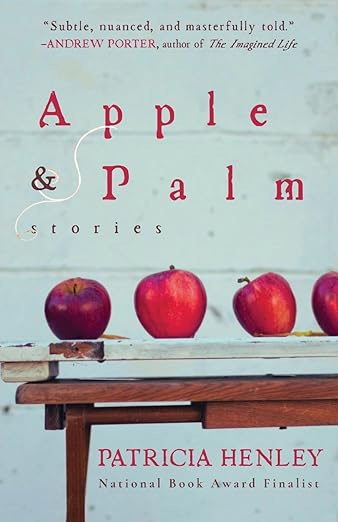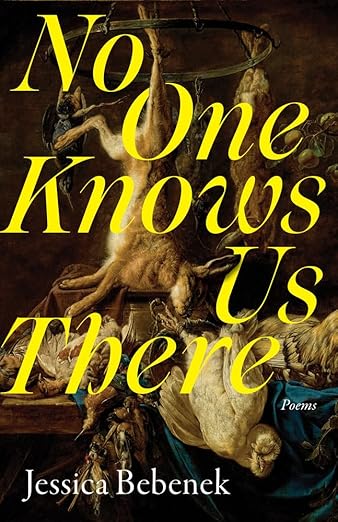.jpg)
 Patricia Henley’s fifth collection of stories Apple & Palm is forthcoming in March 2026 from Cornerstone Press. She is the author of three novels, five collections of stories, two chapbooks of poetry, and a stage play. Rob Davidson is the author of six books, including Welcome Back to the World: A Novella and Stories, winner of the 2025 National Indie Excellence Award in Short Stories. This conversation is a wide ranging chat between these two authors about writing and their work, persistence, curiosity, the mysterious creative process, creating a regular writing practice (under duress), writing about place, diversity, their writing obsessions, and lots more.
Patricia Henley’s fifth collection of stories Apple & Palm is forthcoming in March 2026 from Cornerstone Press. She is the author of three novels, five collections of stories, two chapbooks of poetry, and a stage play. Rob Davidson is the author of six books, including Welcome Back to the World: A Novella and Stories, winner of the 2025 National Indie Excellence Award in Short Stories. This conversation is a wide ranging chat between these two authors about writing and their work, persistence, curiosity, the mysterious creative process, creating a regular writing practice (under duress), writing about place, diversity, their writing obsessions, and lots more.
Read more →
 We have a copy of Apple & Palm by Patricia Henley to give away!
We have a copy of Apple & Palm by Patricia Henley to give away! Johnson’s writing–her vivid detail, sharp dialogue and insightful, deftly witty scenes–reveal a family of distinct, complicated individuals grappling with the internal and external impact of our society’s stereotypes, but also asks us to look more closely at our own relationships.
Johnson’s writing–her vivid detail, sharp dialogue and insightful, deftly witty scenes–reveal a family of distinct, complicated individuals grappling with the internal and external impact of our society’s stereotypes, but also asks us to look more closely at our own relationships. Angie Wright’s memoir Loving My Enemies and Other Outlandish Pursuits highlights the cultural and ideological diversity of the American South and illuminates the long history of dedicated and courageous work on many fronts for social justice. Even more so, the book shares how Angie learns through time that becoming more effective in her life’s work is intertwined with and inextricable from her personal growth and healing.
Angie Wright’s memoir Loving My Enemies and Other Outlandish Pursuits highlights the cultural and ideological diversity of the American South and illuminates the long history of dedicated and courageous work on many fronts for social justice. Even more so, the book shares how Angie learns through time that becoming more effective in her life’s work is intertwined with and inextricable from her personal growth and healing. .jpg)
 Patricia Henley’s fifth collection of stories Apple & Palm is forthcoming in March 2026 from Cornerstone Press. She is the author of three novels, five collections of stories, two chapbooks of poetry, and a stage play. Rob Davidson is the author of six books, including Welcome Back to the World: A Novella and Stories, winner of the 2025 National Indie Excellence Award in Short Stories. This conversation is a wide ranging chat between these two authors about writing and their work, persistence, curiosity, the mysterious creative process, creating a regular writing practice (under duress), writing about place, diversity, their writing obsessions, and lots more.
Patricia Henley’s fifth collection of stories Apple & Palm is forthcoming in March 2026 from Cornerstone Press. She is the author of three novels, five collections of stories, two chapbooks of poetry, and a stage play. Rob Davidson is the author of six books, including Welcome Back to the World: A Novella and Stories, winner of the 2025 National Indie Excellence Award in Short Stories. This conversation is a wide ranging chat between these two authors about writing and their work, persistence, curiosity, the mysterious creative process, creating a regular writing practice (under duress), writing about place, diversity, their writing obsessions, and lots more.  Radegonde and the First Crusade spans four years from the time Radegonde leaves home to the bloody conclusion of the novel. Lauren Small vividly brings the time to life while spinning a tale of one young woman’s struggle with faith. At the Council of Clermont at the end of 1095, Pope Urban II issued a call to arms that would result in the first crusade – the People’s Crusade – and the capture of Jerusalem, liberating the holy city from Muslim control. Related in the present tense by an omniscient third-person narrator, the story focuses on Radegonde, both her interior struggles with faith and sin, forgiveness and love, and the outward challenges she faces.
Radegonde and the First Crusade spans four years from the time Radegonde leaves home to the bloody conclusion of the novel. Lauren Small vividly brings the time to life while spinning a tale of one young woman’s struggle with faith. At the Council of Clermont at the end of 1095, Pope Urban II issued a call to arms that would result in the first crusade – the People’s Crusade – and the capture of Jerusalem, liberating the holy city from Muslim control. Related in the present tense by an omniscient third-person narrator, the story focuses on Radegonde, both her interior struggles with faith and sin, forgiveness and love, and the outward challenges she faces. Brilliantly and realistically, Bebenek narrates no turning point, reaches no culminating moment, offers no conclusions. The final poem sends the reader back to the beginning and the inescapability of death. Rooted in concrete images, the poems resist both pious moralizing and maudlin regret by honestly depicting an embodied self, enmeshed in the empirical world. With economy and specificity, Bebenek’s lines embrace the totality of experience.
Brilliantly and realistically, Bebenek narrates no turning point, reaches no culminating moment, offers no conclusions. The final poem sends the reader back to the beginning and the inescapability of death. Rooted in concrete images, the poems resist both pious moralizing and maudlin regret by honestly depicting an embodied self, enmeshed in the empirical world. With economy and specificity, Bebenek’s lines embrace the totality of experience. The Sonnets have been quite popular for several centuries now and have given rise to countless interpretations from Shakespeare being bisexual, homosexual, slave to love to the author being Queen Elizabeth to Edward De Vere. There is a library of interpretations and commentaries on the sonnets.
The Sonnets have been quite popular for several centuries now and have given rise to countless interpretations from Shakespeare being bisexual, homosexual, slave to love to the author being Queen Elizabeth to Edward De Vere. There is a library of interpretations and commentaries on the sonnets. The book is full of beautiful, funny, often tragic contradictions that are so well woven into the fast-paced plot that at times you have to force yourself to slow down to appreciate them. The Cross Thieves is a terrific book, full of gritty violence and desperate characters, but also infused with a tenderness that borders on transformative.
The book is full of beautiful, funny, often tragic contradictions that are so well woven into the fast-paced plot that at times you have to force yourself to slow down to appreciate them. The Cross Thieves is a terrific book, full of gritty violence and desperate characters, but also infused with a tenderness that borders on transformative. Prairie Ashes is well worth your time. Whatever your interests, it is the duty of the working class as much as it is the rentier class to understand what was once possible in the pursuit of a more equal society. Orwell found it once in Spain; even if for a brief time, it proves that things must not always be as they are, as well that authority is not invincible or necessary in its unjustified form.
Prairie Ashes is well worth your time. Whatever your interests, it is the duty of the working class as much as it is the rentier class to understand what was once possible in the pursuit of a more equal society. Orwell found it once in Spain; even if for a brief time, it proves that things must not always be as they are, as well that authority is not invincible or necessary in its unjustified form.